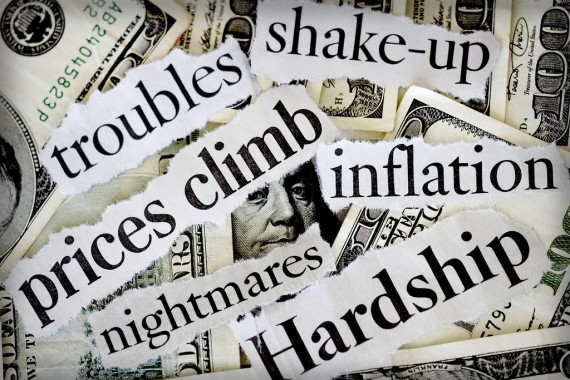It’s Money That Matters
While political junkies dissect every vote and utterance, most Americans vote based on their gut sense of how the economy is doing.
Paul Krugman warns against the pundit delusion, “the belief that the stuff of daily political reporting — who won the news cycle, who had the snappiest comeback — actually matters.”
What political scientists, as opposed to pundits, tell us is that it really is the economy, stupid. Today, Ronald Reagan is often credited with godlike political skills — but in the summer of 1982, when the U.S. economy was performing badly, his approval rating was only 42 percent.
My Princeton colleague Larry Bartels sums it up as follows: “Objective economic conditions — not clever television ads, debate performances, or the other ephemera of day-to-day campaigning — are the single most important influence upon an incumbent president’s prospects for re-election.” If the economy is improving strongly in the months before an election, incumbents do well; if it’s stagnating or retrogressing, they do badly.
But, as I noted this morning in a discussion of the differences between DC Elites and Regular Americans, it’s not so much the economy itself that matters but perceptions.
In 1996 voters were asked whether the deficit had gone up or down under Bill Clinton. It had, in fact, plunged — but a plurality of voters, and a majority of Republicans, said that it had risen.
There’s no point berating voters for their ignorance: people have bills to pay and children to raise, and most don’t spend their free time studying fact sheets. Instead, they react to what they see in their own lives and the lives of people they know. Given the realities of a bleak employment picture, Americans are unhappy — and they’re set to punish those in office.
Krugman goes a bit too far, I think, in arguing that nothing else matters. Animus against the stimulus package, the bank and auto bailouts, and the health care bill certainly matter in motivating voters who are on the fence. But, if the economy is doing extraordinarily well, incumbents can survive just about anything.







You beat me to this, as I wanted to discuss it this morning but ran out of time and have otherwise been busy.
While I agree that one cannot reduce it all to monocausality, I do think that much of the upset at things like TARP and whatnot are very much based in the general economic circumstances. If unemployment were 7% or 6%, there would be a lot less anger about TARP (and, well, whatever else you can think of).
We know this to be true, if anything, because most people, including those who are extremely angry about TARP have no idea what it was or which administration is responsible for it.
Heck, the whole deficit and debt issues are hardly new, nor is the idea that we have long-term structural problems related to social spending.
I do think that much of the upset at things like TARP and whatnot are very much based in the general economic circumstances.
No doubt. I’m amused at the number of conservative bloggers who think the Tea Parties are going to replace the GOP because of public anger over deficit spending. Not only could most Tea Partiers not tell you within +/- $1 trillion how much the debt is but they clearly don’t remember Ross Perot.
“Animus against the stimulus package, the bank and auto bailouts, and the health care bill certainly matter in motivating voters who are on the fence. ”
I doubt that. I agree with Krugman that most people are not tapped into the issue wars that pundits and bloggers thrive on.
I suspect that animus against the stimulus and the others that you mention matter in motivating voters who are already motivated – these issues add to their motivation because they track these issues, and they track them because they are political junkies in the first place.
They can only vote once though, no matter how motivated they are.
Immediate concerns trump long range concerns. If I were unemployed and heard all the Republicans saying they are blocking extension of benefits because they are concerned about the financial future of my grandchildren I would immediately rule them out as viable representatives. If I were a laborer or skilled worker I would favor the auto bailouts because either myself or people like me work there. My wallet is more important than my retirement fund at this time and to listen to some speak again of privatizing SS or extending the retirement age would make them totally unacceptable. The immediate is always more important.
In 1996 voters were asked whether the deficit had gone up or down under Bill Clinton. It had, in fact, plunged — but a plurality of voters, and a majority of Republicans, said that it had risen.
Never accept anything that Paul Krugman writes as being the unvarnished truth.
How is it that the deficit had “plunged” when in fact the total debt increased? US Treasury statistics:
Date – – Debt Held by the Public – – – Intragovernmental Holdings – – -Total Public Debt Outstanding
-09/30/1997 3,789,667,546,849.60 1,623,478,464,547.74 5,413,146,011,397.34
-09/30/1998 3,733,864,472,163.53 1,792,328,536,734.09 5,526,193,008,897.62
-09/30/1999 3,636,104,594,501.81 2,020,166,307,131.62 5,656,270,901,633.43
-09/29/2000 3,405,303,490,221.20 2,268,874,719,665.66 5,674,178,209,886.86
-09/28/2001 3,339,310,176,094.74 2,468,153,236,105.32 5,807,463,412,200.06
The plurality of voters and the majority of Republicans were right and Paul Krugman is a lying shill.
There is many a slip between comment box and published result.
That table looked presentable in the comment box. Sorry for the garbled look of the data.
To help everyone out, the key category is Total Public Debt and it increased every year during the Clinton Administration, starting at $4,411,488,883,139.38 with FY 1993 and ending with $5,807,463,412,200.06 with FY 2001. I provided the detailed breakdown for FY 1997-2001. You can see that every single year saw an increase in the Total Public Debt.
TangoMan says:
Monday, July 19, 2010 at 19:52
” starting at $4,411,488,883,139.38 with FY 1993 and ending with $5,807,463,412,200.06 with FY 2001. ”
That’s a total increase of about 31% during which time US GDP nearly doubled. Conversely, Bush doubled the public debt during which time GDP grew by about 50% and much of that growth was fuelled by consumer debt and profligate public spending.
TangoMan says:
Monday, July 19, 2010 at 19:52
“and Paul Krugman is a lying shill.”
And one of the worlds leading authorities on monetary policy and a nobel laureate whereas you are?
Steven L. Taylor says:
Monday, July 19, 2010 at 14:37
Most of the anger is inchoate, few people could describe TARP if their lives depended upon it. Even then it’s qualified, most people had some vague idea that keeping the banks afloat was necessary even if not popular. I think Krugman overstates it but there’s obviously a connection.
And one of the worlds leading authorities on monetary policy and a nobel laureate whereas you are?
He’s still a lying shill. He used his column in the NYT to claim that there was a Clinton Surplus and that people who thought that Clinton increased the debt were wrong. It’s pretty pathetic of you to ignore the facts and trot out his reputation as a defense of his lying.
As a matter of simple fact, Krugman is correct: there was a federal budget surplus during several years of the Clinton presidency. You are confusing (or so it seems) the national debt with budget deficits. Deficits were lower during Clinton than under Bush (I or II) and, again, there were a few years of surplus. Exactly why is an entirely different discussion. However, Krugman claim’s in that regard are not only not a lie, they are the direct opposite of a lie.
And again: he made not claim in the column about the debt, he made a claim about the deficit (indeed, the word “debt” does not appear in the column). This is no an unimportant distinction, regardless of one’s position on the column’s thesis.
The national debt is not solely a function of the annual budget’s deficits/surpluses.
See, for example, here for data, and as well as here.
If one looks at the second link to a CBO table, one sees that, in fact, the budget deficit declined each year under Clinton and there was, in fact, a budget surplus the last two years. The fact of the said surplus was the argument behind Bush’s first tax rebate, in fact.
One can argue that there really wasn’t a surplus because of other issues (e.g., the role of the Social Security trust fund) or argue the why of the surpluses/declining deficits, but to state that Krugman is lying about this fact is simply incorrect.
Note: I left a crucial “not” out of a sentence above and have edited the comment to reflect that fact.
TangoMan says:
Tuesday, July 20, 2010 at 09:52
And one of the worlds leading authorities on monetary policy and a nobel laureate whereas you are?
“He’s still a lying shill.”
As is very obvious from the omnipresent name calling in your posts, anyone who disagrees with you could well fit this description.